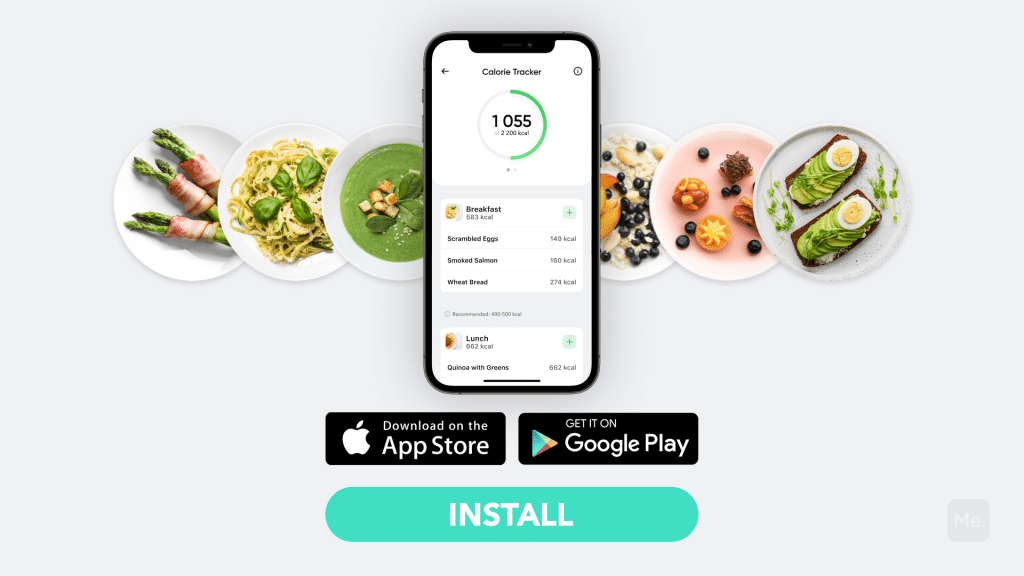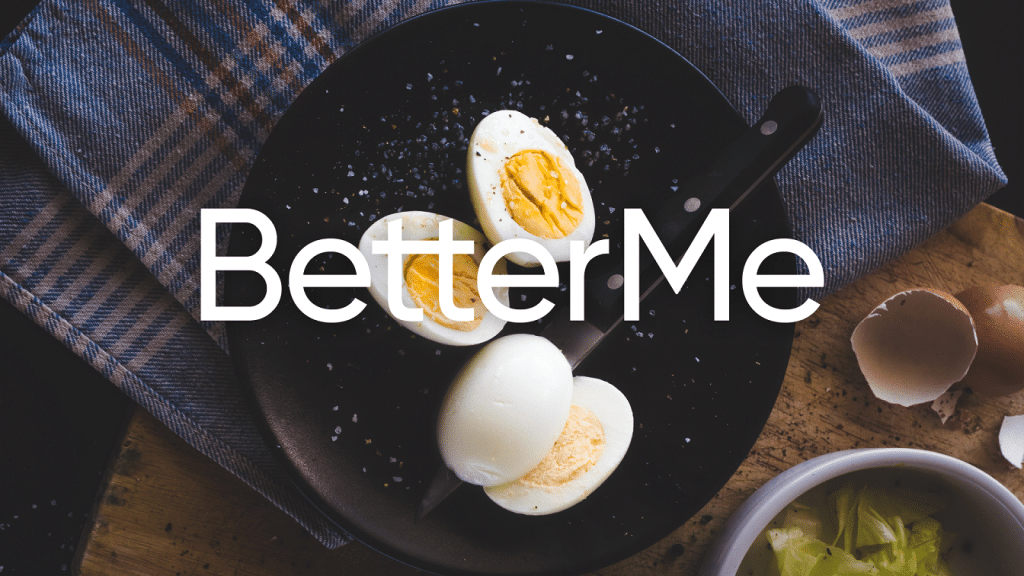Did you know that your brain and gut are connected? Recent studies have suggested that the health of your gut influences your mood and behavior (5). The gut microbiome, which refers to all microorganisms in the gut, is made up of over 500 bacteria species. Researchers have discovered a possible neural connection between the gastrointestinal tract and the brain through a network called the “brain-gut axis” In this article, we will summarize how gut health impacts mental health, suggest simple ways to improve your connection between brain and gut and provide a food list you can use to follow these diet recommendations.
Get your personalized
meal plan!
How Is The Gut Connected To The Brain?
There are two ways your gut is connected to your brain:
Chemical Connection
Have you ever felt a gut-wrenching feeling in the pit of your stomach in response to anxiety, excitement, or anger? This sensation may have resulted from the activation of certain neurons in your intestines.
There are about 100 million neurons in the intestinal lining, which is why scientists sometimes refer to this region as “the second brain” (19). The presence of so many neurons makes sense because digestion is a complex process requiring multiple steps and coordination throughout the gastrointestinal tract.
Like the neurons in the brain, intestinal neurons are electrically excitable cells that communicate with each other through chemical neurotransmitters. Neurotransmitters such as serotonin are responsible for inhibiting or triggering intestinal muscle contractions (15).
They also appear to influence mood and behavior by communicating with neuron cell bodies in the gut-brain axis. Other chemicals produced by gut neurons include dopamine, acetylcholine, and norepinephrine (15).
These neurotransmitters have a direct impact on the surrounding intestinal tissue as well as other organs in the body. For example, nitric oxide produced by nerve cells can help control blood flow to different parts of your digestive tract (17).
Physical Connection
That’s not all, there is a physical element to the gut-brain connection. It’s called the vagus nerve.
This nerve connects the brain to many major organs, including the intestines (24).
The vagus nerve is responsible for transmitting information from your gut to your brain as well as relaying messages from your head down to your belly.
Gut And Brain Interaction: Good And Bad News
It’s a good thing that there is a connection between the gut and brain. When activated, neural cells in your gut can send messages to stimulate the release of neurotransmitters that affect relaxation and calmness.
However, chronic stress and prolonged anxiety can cause a negative impact on the gut microbiome (18). As we mentioned earlier, it’s estimated that there are about 500 different species of bacteria living in your gut (23).
Many of these bacteria perform helpful functions like promoting healthy digestion, producing vitamins and essential amino acids, and stimulating immunity (23).
An imbalance or the presence of disease-causing bacteria can negatively impact these processes and may lead to mental health problems.
Read More: Weight Loss Rewards: Find Out Healthy Non-Food Options To Keep You Motivated On Your Journey
What Is The Gut-Brain Connection Diet?
Gut bacteria affects brain health, so ensuring a healthy balance may improve your brain health. The Gut-brain connection diet is all about improving the balance of healthy bacteria in your gut. There are two steps to this diet:
- Step 1: Reduce or eliminate foods that feed harmful bacteria while increasing fiber intake
- Step 2: Take dietary supplements (probiotics) or eat naturally probiotic-rich foods to improve the ratio of healthy gut flora (good bacteria).
1. Cut Back On Sugar
A diet high in sugar can have a very negative effect on your gut microbiome by providing food for harmful bacteria (9). While on the gut-brain connection diet, you’ll want to cut back on ultra processed foods that contain added sugars such as high-fructose corn syrup.
Sugary breakfast cereals, granola bars, and baked goods are obvious sources of sugar, but so are seemingly healthy choices like dried fruit and flavored yogurt. If you’re craving something sweet, try adding fresh fruit to plain Greek yogurt to satisfy your sweet tooth.
2. Cut Back On Unhealthy Fats
Another dietary element that can negatively impact gut health is unhealthy fat. Ultra processed foods are often loaded with harmful trans fats, which are known to cause inflammation in the digestive tract (12). Foods high in saturated fats, such as red and processed meats, are also known to be harmful to the health of the digestive tract.
On the other hand, healthy polyunsaturated fats may help promote healthy microbiota by feeding the right bacteria (10).
By reducing or eliminating unhealthy saturated and harmful trans fats, you’ll encourage your gut microbiome to flourish with good bacteria.
3. Eat More Fiber
Fiber promotes the growth of beneficial bacteria (2). It is found in fruits, vegetables, legumes, whole grains, nuts, and seeds.
A high-fiber diet also helps reduce blood cholesterol levels, which are a major risk factor for heart disease (6). Fiber is an indigestible carbohydrate that the body cannot break down and absorb.
However, fiber has many health benefits including promoting proper bowel function and helping to lower cholesterol levels (6).
The average American only eats about 15 grams of fiber per day, but experts recommend adding more to your diet by increasing fiber intake gradually to 20 to 35 grams daily (8).
4. Eat Good Fats
Healthy fats are an excellent source of energy when you need a boost, but they play another important role by helping support healthy brain function (1). This is one reason following the diet above is important for mental health.
5. Eat Probiotic-Rich Foods & Supplements
Probiotics are live microorganisms that work as a sort of reset button for the gut microbiome. When taken regularly, they may help promote healthy digestion and balance bacteria in your GI tract (7).
Probiotics might not only help balance the healthy bacteria in your gut but also support overall health.
In addition to taking a supplement, you can increase your intake of probiotic-rich foods. These include yogurt, tempeh, sauerkraut and kimchi.
6. Reduce Stress And Get More Sleep
Stress and lack of sleep can worsen anxiety and depression.
The human body is not designed to handle constant stress for long periods.
Lowered immunity, weight gain, increased blood pressure, increased risk of heart disease and digestive problems are just a few of the consequences associated with chronic stress (22).
Not getting enough sleep has a similar effect on the body and can lead to mood problems. When you’re sleep-deprived, the brain’s serotonin activity decreases, which can increase feelings of depression and anxiety (20).
Fortunately, both stress reduction and getting better sleep provide immediate benefits to mental health by restoring brain function and improving mood.
Whether you’re looking to simply pep up your fitness routine, jazz up your diet with mouth-watering low-calorie recipes or want to get your act together and significantly drop that number on your scale – BetterMe app has got you covered! Improve your body and revamp your life with us!
Are There Any Other Benefits?
Aside from improved mental health, the gut-brain connection diet may have other benefits.
A balanced gut microbiome may also support weight management and prevent metabolic syndrome, a group of risk factors that increases your chances of developing heart disease, diabetes, or stroke. A balanced gut microbe could also reduce the risk of some cancers such as colorectal cancer (3).
Last but not least, it can increase nutrient absorption and improve the immune system (4).
What Foods Can You Eat On The Gut-Brain Connection Diet?
The following foods should be the main focus of this diet, as they are believed to be specifically beneficial for the gut-brain axis:
Foods Rich In Omega-3 Fats
Studies show that Omega-3s can increase good bacteria in the gut and may reduce the risk of Alzheimer’s disease (21).
Some sources of Omega-3’s include:
- Anchovies
- Cod liver oil
- Salmon
- Mackerel
- Herring
- Pumpkin seeds
- Flax seeds
- Walnuts
- Chia seeds
- Leafy greens (e.g., kale, spinach)
Read More: 10 Family Exercise Ideas That Are Fun And Effective
Fermented Foods
Fermented foods are rich in probiotics. These are beneficial bacteria that promote healthy digestion and improve overall health (7).
Some examples of fermented foods are:
- Yogurt
- Sauerkraut
- Kimchi
- Miso
- Tempeh
- Pickles
- Sour cream
- Natto
- Kombucha
- Kefir
- Yogurt (with live cultures)
- Grass-fed cheese
High-Fiber Foods
Gut bacteria depend on fiber to survive. Fiber-rich foods, also called prebiotic foods, promote healthy gut flora and keep you full longer (6).
The following foods are perfect for this:
- Apples
- Asparagus
- Avocado
- Bananas
- Barley
- Buckwheat
- Cabbage
- Celery
- Chicory root (inulin)
- Garlic
- Onion
- Legumes (beans, lentils)
- Whole grains (e.g., brown rice)
- Burdock root
Foods Rich In Polyphenols
Polyphenols are antioxidant compounds found in plants. These nutrients have been shown to improve gut microbiome diversity, which has several health benefits. There is also some evidence suggesting they may improve cognition and brain health (16).
They’re abundant in:
- Cocoa or dark chocolate
- Berries
- Green tea
- Red wine
- Extra-virgin olive oil
- Coffee
If you struggle to even flirt with the idea of giving up your favorite foods or working out till your legs give way – BetterMe app is here to breathe a fresh perspective into the way you view the weight loss process! Check out the app and experience the fun side of fitness and dieting with BetterMe!
Foods Rich Tryptophan
Tryptophan is an amino acid that helps produce serotonin, a neurotransmitter that helps improve mood (13).
Some foods which are high in tryptophan are:
- Almonds
- Chickpeas
- Pumpkin seeds
- Milk
- Turkey
- Cheese (cottage, cream)
- Eggs
- Soybeans
- Tuna
- Avocado
- Seaweed
- Spirulina
- Oat Bran
Foods Rich In Vitamin B12 And Folate
Vitamin B12 is needed for proper mental health and regulates the central nervous system. The vitamin also helps maintain healthy nerve cells and getting enough of it may reduce symptoms of depression (25).
The best food sources include:
- Salmon
- Organ meats (e.g., liver, kidneys)
- Anchovies
- Clams
- Meat and poultry
- Eggs
- Spirulina
- Seaweed
- Nutritional yeast flakes
- Shiitake mushrooms
The Bottom Line
The gut-brain connection diet focuses on foods that may help reduce inflammation and promote healthy gut flora.
This is because the brain and gut are linked by a short highway of neurons called the vagus nerve, which is thought to be able to influence your mood.
It’s also thought that consuming probiotic foods may help improve cognitive function, enhance memory and help protect against age-related neurodegeneration.
DISCLAIMER:
This article is intended for general informational purposes only and does not serve to address individual circumstances. It is not a substitute for professional advice or help and should not be relied on for making any kind of decision-making. Any action taken as a direct or indirect result of the information in this article is entirely at your own risk and is your sole responsibility.
BetterMe, its content staff, and its medical advisors accept no responsibility for inaccuracies, errors, misstatements, inconsistencies, or omissions and specifically disclaim any liability, loss or risk, personal, professional or otherwise, which may be incurred as a consequence, directly or indirectly, of the use and/or application of any content.
You should always seek the advice of your physician or other qualified health provider with any questions you may have regarding a medical condition or your specific situation. Never disregard professional medical advice or delay seeking it because of BetterMe content. If you suspect or think you may have a medical emergency, call your doctor.
SOURCES:
- A healthy approach to dietary fats: understanding the science and taking action to reduce consumer confusion (2017, nutritionj.biomedcentral.com)
- Dietary Fiber, Gut Microbiota, and Metabolic Regulation—Current Status in Human Randomized Trials (2020, mdpi.com)
- Gut Microbiome: Profound Implications for Diet and Disease (2019, mdpi.com)
- Gut microbiota, metabolites and host immunity (2016, ncbi.nlm.nih.gov)
- Gut microbiota’s effect on mental health: The gut-brain axis (2017, ncbi.nlm.nih.gov)
- Health benefits of dietary fiber (2009, academic.oup.com)
- Health Benefits of Probiotics: A Review (2013, hindawi.com)
- High Fiber Diet (2021, ncbi.nlm.nih.gov)
- High Intake of Sugar and the Balance between Pro- and Anti-Inflammatory Gut Bacteria (2020, mdpi.com)
- Impact of Omega-3 Fatty Acids on the Gut Microbiota (2017, mdpi.com)
- Implications of Diet and The Gut Microbiome in Neuroinflammatory and Neurodegenerative Diseases (2019, mdpi.com)
- Influence of diet on the gut microbiome and implications for human health | Journal of Translational Medicine (2017, biomedcentral.com)
- Influence of Tryptophan and Serotonin on Mood and Cognition with a Possible Role of the Gut-Brain Axis (2015, mdpi.com)
- Long-chain omega-3 fatty acids and the brain: a review of the independent and shared effects of EPA, DPA and DHA (2015, frontiersin.org)
- Neurotransmitters: The critical modulators regulating gut-brain axis (2017, ncbi.nlm.nih.gov)
- Plant polyphenols as dietary antioxidants in human health and disease (2009, ncbi.nlm.nih.gov)
- Role of nitric oxide in the gastrointestinal tract (20018, biomedcentral.com)
- Stress, depression, diet, and the gut microbiota: human–bacteria interactions at the core of psychoneuroimmunology and nutrition (2019, ncbi.nlm.nih.gov)
- That gut feeling (2012, apa.org)
- The Extraordinary Importance of Sleep (2018, ncbi.nlm.nih.gov)
- The Gut-Brain Axis in Alzheimer’s Disease and Omega-3. A Critical Overview of Clinical Trials (2018, mdpi.com)
- The impact of stress on body function: A review (2017, ncbi.nlm.nih.gov)
- The Microbes of the Intestine: An Introduction to Their Metabolic and Signaling Capabilities (2008, ncbi.nlm.nih.gov)
- Vagus Nerve as Modulator of the Brain–Gut Axis in Psychiatric and Inflammatory Disorders | Psychiatry (2018, frontiersin.org)
- Vitamin B12 (2021, ods.od.nih.gov)











